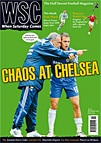 Concerns over dodgy club owners are not confined to England – and some regions are far worse off. Henry Mance reports from a country where gangsters use drug money to own players and win titles
Concerns over dodgy club owners are not confined to England – and some regions are far worse off. Henry Mance reports from a country where gangsters use drug money to own players and win titles
“I left a message to see if you needed players, because I could get you some, and you’d just have to pay the salary, you understand? The players have a certain gratitude towards me.” A decent offer perhaps, but this is from no agent or chairman. It’s from Jorge 40, one of Colombia’s most feared paramilitary leaders, finding time in a hectic schedule of drugs and violence to dabble in the transfer market. He’s offering a director of his local team, Valledupar, several players on loan from Real Cartagena and América de Cali. The drugs influence is back in Colombian football, if it ever went away.
Jorge 40’s story starts in 2004. Real Cartagena needed a high-scoring win over Valledupar to be promoted. They took an early lead, but failed to extend it. Then, late in the second half, the impossible happened: Cartagena scored four to win 5-0. If subtlety was never a strength of the paramilitaries, impunity was: no wrongdoing was ever proven.
A year later, Jorge 40 looked to repay Valledupar with this offer. The phone conversation was intercepted and published in August this year by Semana magazine. Other clubs are also implicated: another paramilitary known as Macaco allegedly controls Pereira FC and has tried to buy Millonarios. An investigation is underway into Cucuta, the surprise of last season’s Copa Libertadores, after a third paramilitary leader confessed to funding the mayoral election campaign of their owner, Ramiro Suárez. Suárez was arrested in September, accused of ordering a lawyer’s murder.
In response, directors of Valledupar and Cartagena have denied paramilitary influence, although none has been able to explain the “gratitude” that Cartagena players might owe Jorge 40. A former vice-president of the national FA, Gabriel Camargo, was more forthcoming: “This is clear as daylight and everyone knows it.”
Football’s link to the drugs trade was most visible in the 1980s, the heyday of Medellín and Cali cartels. Then the major teams’ backers were well known: Medellín’s Atlético Nacional had Pablo Escobar; Bogotá’s Millonarios enjoyed the childlike generosity of “The Mexican”, Gonzalo Rodríguez Gacha; and América de Cali were controlled by the Cali cartel’s Rodríguez Orejuela brothers. Yet their fame was their downfall. For the US and Colombian governments, eliminating the druglords became a point of pride – a point that was proved with the police’s murder of Gacha in 1989 and Escobar in 1993, and the jailing of the Rodríguez Orejuela brothers two years later.
A few things have changed. Those flush with drugs money learned not to flash it around – the real powers behind the major clubs are no longer public knowledge. Nor are the new mafia influences just bankrolling their favourite team. They have business interests, too. Macaco apparently wanted to buy Millonarios in order to put players whom he “owned” in the team – potentially boosting their transfer value.
The paramilitaries have been helped by the lax regulation of the Colombian game. Investigations into money-laundering have dragged on fruitlessly for years. Other critics blame the clubs’ chaotic finances, dependent on wealthy individuals. The exceptions are Deportivo Cali, who have a Barcelona-style membership system. Yet a government plan to replicate Deportivo’s membership structure in other clubs was effectively sunk by FIFA’s ban on state intervention.
Nor are the fans clamouring for tighter regulation. When the cartels’ millions disappeared in the 1990s, the reaction was not so much relief as disappointment: fans mourned their teams’ lost domestic and international success. In 1989, Atlético Nacional had become the first Colombian team to win the Copa Libertadores; América de Cali reached the final in three consecutive seasons from 1985; Millonarios haven’t won the league since Gacha’s death. For the fans, football’s dirty underbelly is not just a Colombian problem. Indeed, if it brings success, it’s not even a problem.
For the players, too, drugs money can be a blessing. Before it arrived, Colombians joked that players spent half the game counting the spectators to see if there would be enough gate receipts to pay them. Currently, Freddy Rincón, who scored twice in a real 5-0 victory – Colombia’s 1993 trouncing of Argentina – is wanted in Panama on money-laundering charges. One of the many who have blurred the line between football and the drugs trade, Rincón will, if convicted, become one of the few to pay for it.
From WSC 249 November 2007